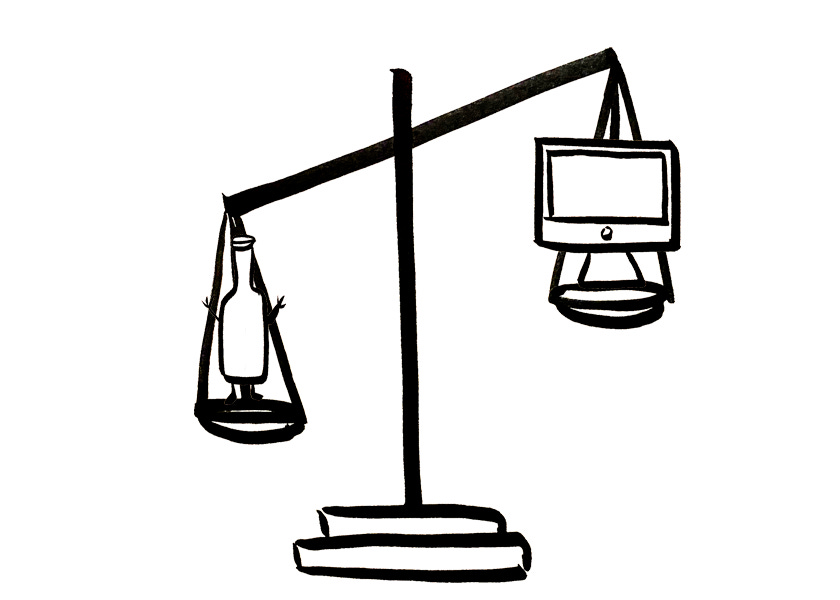Future-Proofing Your Value in the Wine and Spirit Industry
Leverage comes from doing things that computers and other people cannot
The future of the wine and spirit industry is coming for us all. Whatever its form, we know that technological innovation often devalues labor the same way inflation depreciates money. Still, we can prepare for the future because we already know:
How labor is valued, and…
The avenues for leveraging worth
With an appreciation of these two things, comes the understanding that we needn’t gird ourselves for times ahead so much as prepare to embrace the opportunities that will abound.1
How Labor is Valued
The notion that hard work is worth all that much is a fairy tale. It’s not how hard you work (input), it’s the value you generate (output) that employers and customers pay for. Output can be measured in sales generated, content created, projects completed, code written, etc.2 When your input (hours worked x intensity of that work) is directly correlated to your output, you’re limited in your earning potential. For instance, if you clean houses, you’re limited by the hours there are in a day. No matter how hard you work, you can only clean so many. There’s a corollary with salespeople and the size of their territory/the number of accounts they have. Despite what your boss says, the sky isn’t the limit; the limit is defined by the maximum number of accounts you can reasonably serve.
Individuals generate the most valuable output when:
They do something a computer, a robot, or computer code can’t
This is why a janitor’s job won’t disappear anytime soon. A robot capable of cleaning a bathroom has yet to be invented. On the other hand, note that sales reps input their customers’ orders with decreasing frequency as technology has empowered buyers.
They do something few other people are able or willing to do
While janitors have job security, the position doesn’t pay a lot because nearly anyone can do the labor required of the role. The same is true for salespeople.
Their work is impactful (reaches as many people as possible as meaningfully as possible)
Highly compensated individuals do work that reverberates with tens of thousands, hundreds of thousands, or millions of people. This is the nature of celebrity and stardom. Look at Gary Vaynerchuk and Jancis Robinson. They possess two wildly different personalities, styles, and areas of expertise. What do they have in common? Large audiences that actively listen.
The Avenues for Leveraging Worth
One of the largest shifts in the wine and spirits industry over the last 20 years has been the devaluation of product knowledge. It used to be that an MW or MS credential was a license to print money. That is no longer the case.
Simply knowing a lot about wine and spirits doesn’t make you valuable to employers or customers any more than being literate in English makes you Shakespeare. Knowledge and, to a lesser extent, certification are the table stakes for participation in the industry. Compensation is not commensurate with one’s ability to memorize facts about grape varieties and appellations in an age where you can look up anything you need. We learn those things so that we can more adeptly sell or manage products, processes, or people (aka generate output).
So where might companies and individuals find leverage?
In a large audience
This is the network effect in action. Whether you’re a company or individual, remember that if all your audience is doing is purchasing your product you’ve missed out on a tremendous opportunity. They have the potential to amplify your message. The bigger your audience, the better your leverage.
In a long time horizon
A short time horizon limits your future capacity for output. If your work is thought of in terms of days, weeks, or even months, you are short-selling the future for the present. Cashiers and order board admins think in shifts. Salespeople think in months. Managers think in quarters. Your leverage grows the more you extend your time horizon.
In the creation or sale of products with no marginal cost of replication
This might appear paradoxical in the consumer packaged goods space. While suppliers, importers, distributors, and retailers all sell bottles, leverage is to be found in the creation of content or services that can scale.3 Bottles are sold 1:1. Content and services can be sold 1:many. It’s also worth noting that some companies like Kermit Lynch Wine Merchant and De Maison Selections are content creation companies as much as they are also importers.
Future-proofing one’s worth is not necessarily about learning the latest technology, though it might aid you. It’s about achieving leverage.
The ideas for this post were inspired by Naval Ravikant’s 2018 tweetstorm: “How to Get Rich (without getting lucky).”
It is most difficult to untangle the output of managers of people. Are they or their teams responsible for the output generated? Jim Clifton of Gallup writes, “…a staggering 70% of the variation between great workplace engagement and lousy workplace engagement can be explained just by the quality of the manager or team leader.” As it’s been said, people quit bosses, not companies.
Podcasts, media, and newsletters are examples of content. Examples of companies that offer services include but aren’t limited to Vinovest, Wine-Searcher, SevenFifty, and Speakeasy. Some enterprises offer a combination of content and services like Vivino and Winc. Note that, though companies are cited, individuals can leverage the creation of content and services, too.

